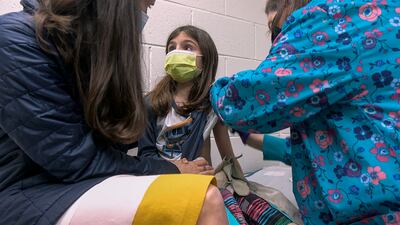Pfizer-BioNTech could seek emergency authorisation for use of its Covid-19 vaccine in children aged between 5 and 11 by early October.
This will be followed by those as young as six months in November.
The company is conducting phase 3 studies of its vaccine on children aged between six months and 11 years.
Speaking at an industry conference this week, a Pfizer executive said it expects to have safety and immunogenicity data for children aged 5 to11 available in around two weeks, at the end of September.
Data for the youngest age group, six months to 5 years, will be available around a month later, at the end of October.
The company will then have to file an application for emergency use for both groups if the vaccine proves safe and effective.
That could come for children aged 5 to 11 in early October, “assuming the data is positive,” said Pfizer’s chief financial officer Frank D'Amelio at the Morgan Stanley 19th Annual Health Conference.
The emergency authorisation application for the youngest age group, 6 months to 5 years, could follow "in a month shortly thereafter", if again the data is positive, he said.

Once the applications are filed, the US Food and Drug Administration will need time to review the data.
Former FDA Commissioner and Pfizer board member Scott Gottlieb said that could take four to six weeks.
The vaccine has been available to older children, aged 12 and above, in the UAE since mid-May.
The vast majority suffer only mild symptoms, or none at all.
However, they can and do catch the virus and transmit it, and a small number become very sick or die as a result.
A recent study reported in the journal Pediatrics showed Covid-19 led to more symptoms and complications than the flu in children, with underlying health conditions such as asthma and obesity presenting bigger risks.
According to the research, pneumonia and hypoxia, or a lack of oxygen, occurred more frequently in Covid-19 than seasonal flu.
Childhood admissions to hospitals in the US have been rising in recent weeks due to the highly contagious delta variant.
“We have a lot of children in hospitals now,” said Dr Anthony Fauci, the leading infectious disease expert in the US, at a lecture hosted by the London School of Hygiene and Tropical Medicine earlier this month.
“So even though, relatively speaking, compared to an adult they don’t get as seriously ill, we have lost more children from Sars-CoV-2 than we ever lose for influenza — and we vaccinate children against influenza.”
Children can also suffer from "long Covid".
According to the British Medical Journal, a recent large study conducted in the UK found as many as one in seven children, 14 per cent, may still have symptoms 15 weeks later.
Headache, fatigue and shortness of breath are the most common lingering symptoms, according to the research by the UCL Great Ormond Street Institute of Child Health.
“We don’t know what the effects are going to be on anyone, including children,” said Dr Fauci.
“So it may be that much to our dismay that children who get infected have long-term consequences that we don’t fully appreciate right now.
“For those reasons, one of transmissibility, one of the seriousness of the disease and one of uncertainty about long-range consequences, I come down strongly on ultimately vaccinating our children.”


